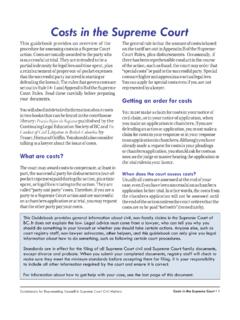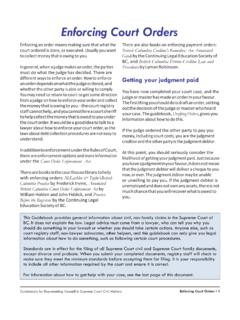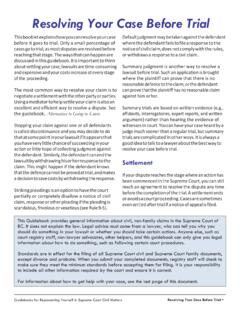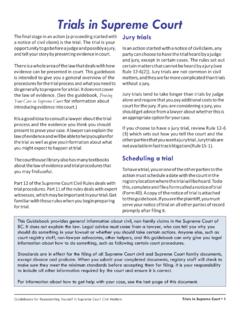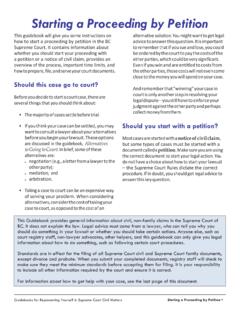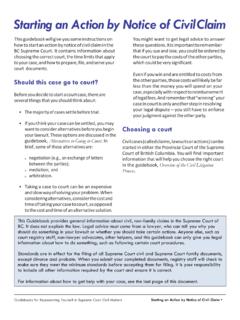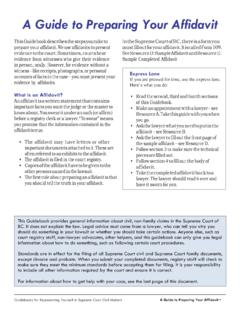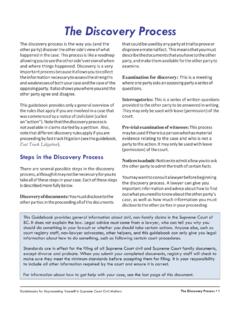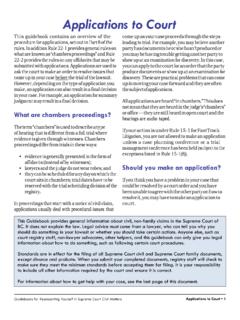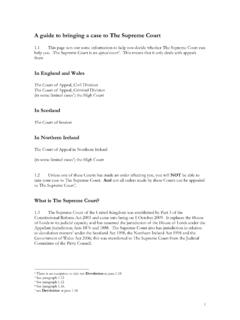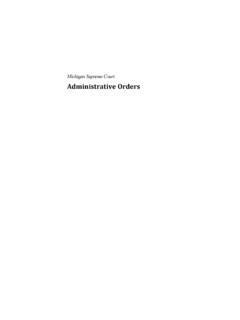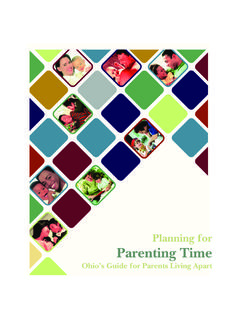Transcription of Proving Your Case in Supreme Court
1 Proving Your Case in Supreme Court Part 1 About the Supreme You can get information about legal actions in the Supreme Court of BC by dropping into the Centre Court of BC Monday to Friday, between 9:00 to noon or 1:30. to 4:00 If you are preparing your case to be heard in the Supreme Court of British Columbia, there is a lot If you do not live near Vancouver, you can go to their you will need to know about the Court system, the law website at that applies to your case, and how to prove your case in Court . Centre staff or the website resources can help you: You need evidence to prove your case in Court . There learn about the Court system and Court are many rules about how you can bring evidence procedures, into Court . This book introduces you to the general get legal information, principles of evidence and explains the kind of locate and fill out the relevant Court forms, evidence you will need in pre-trial Court hearings as find out about free legal advice, and well as the Court hearing itself.
2 Find alternatives to Court . These rules mean that you can't just tell your story The Centre's website also has an online presentation to a judge as if you were having a conversation that explains how to take your case to the Supreme with a friend. So it's important to have a basic Court of BC. understanding of these rules before you go to Court . The Self-Help Centre materials on the website How to Learn About the Court System explain many important Court procedures, such as starting or defending a civil proceeding, how to There are several ways you can learn about the Court conduct a chambers application, and the discovery system. If you live near Vancouver, you can drop process. The guidebook, Overview of the Civil into the Vancouver Justice Access Centre's Self-Help Litigation Process provides general information about and Information Services near the Courthouse. the Court system. It is located at Room 274 800 Hornby Street, Vancouver.
3 This Guidebook provides general information about civil, non-family claims in the Supreme Court of BC. It does not explain the law. Legal advice must come from a lawyer, who can tell you why you should do something in your lawsuit or whether you should take certain actions. Anyone else, such as Court registry staff, non-lawyer advocates, other helpers, and this guidebook can only give you legal information about how to do something, such as following certain Court procedures. Standards are in effect for the filing of all Supreme Court civil and Supreme Court family documents, except divorce and probate. When you submit your completed documents, registry staff will check to make sure they meet the minimum standards before accepting them for filing. It is your responsibility to include all other information required by the Court and ensure it is correct. For information about how to get help with your case, see the last page of this document.
4 Guidebooks for Representing Yourself in Supreme Court Civil Matters Proving Your Case in Supreme Court 1. Get Help With Your Case Before you start your claim, you should think about resolving your case without going to Court (see the guidebook, Alternatives to Going to Court ). If you do not have a lawyer, you will have to learn about the Court system, the law that relates to your case, what you and the other side need to prove, and the possible legal arguments for your case. You will also need to know about the Court rules and the Court forms that must be used when you bring a dispute to Court . Legal Information Online Legal advice All Guidebooks for Representing Yourself in BC You may be eligible for free (pro bono) legal Supreme Court Civil Matters, along with advice. additional information, videos and Access ProBono Society of BC's resources for Supreme Court family website gives you information about and civil cases are available on the the legal assistance that is available to Justice Education Society website: you: Legislation Clicklaw gives you information about BC Legislation (statutes), regulations, many areas of law and free services to and Rules of Court can be found at: help you solve your legal problems: Court rules and forms Supreme Court forms can be completed in The Supreme Court of BC's website has information for people who are 3 ways: representing themselves in Court : 1.
5 Completed online and filed at: elf-represented_litigants/ Legal information services 2. Completed online, printed and filed at the The Vancouver Justice Access Centre's, registry Self-help and Information Services 3. Printed, completed manually and includes legal information, education and filed at the registry referral services for Supreme Court family Court forms that can be completed online and civil cases. It is located at 290 - 800 are available at: Hornby Street in Vancouver (open Monday to Friday): house-services/documents-forms- records/ Court -forms/sup-civil-forms Printable Court forms are available at: For information about other Justice Access Centre services in Vancouver and Nanaimo, see: Common legal terms You can find out the meaning of legal ut-bcs-justice-system/jac terms at: Family law For information about family law claims, see: 2 Proving Your Case in Supreme Court Guidebooks for Representing Yourself in Supreme Court Civil Matters The Civil Litigation Process The judge will not help you organize your case or tell you how to make a good legal argument.
6 The following list shows you the steps that are taken in a typical case in the Supreme Court of BC. Not all steps may need to be taken in your case, but the list Getting Ready for Court provides a general outline of the procedure. The most important things you can do to prepare for Court are: 1. File pleadings to define the issues in your case. Actions are started with a notice of Learn about the rules and law you need to civil claim or by a petition. Pleadings also present your case to the Court . need to be filed by the defendant or petition Prepare your case. Getting your case organized respondent in the action. See the guidebooks is the most important thing you can do to on starting and defending proceedings in prepare for Court . Supreme Court . 2. Obtain and disclose relevant information Learn about the law and the Rules of Court about your case. The parties must exchange all relevant information about the dispute You must learn about the laws that apply to your before a judge hears the case.
7 Disclosure case. There are four main sources of law: of documents is a very important step in collecting and exchanging information and statutes (also called legislation or Acts);. potential evidence about issues in your case. Rules of Court ;. Regulations;. 3. Get direction or assistance from the Court case law. in pre-trial hearings. The Court will make decisions about procedural issues in your You can learn more about these kinds of law by case before it goes to trial or assist the parties going to the Vancouver Justice Access Centre's Self- in reaching a settlement. These pre-trial Help and Information Services website hearings are chambers applications and pre- ( ). trial conferences. The Supreme Court Rules (also called the Rules . A judge or master can hear pre-trial matters. or the Rules of Court ) set out the procedures that A master is a type of judge who hears only must be followed and the forms that must be used in interlocutory applications.
8 (See the section taking a case through the Court system. on chambers applications below.). The Rules ensure fairness to all the parties involved 4. The trial. A judge will hear your case and in a lawsuit. They tell you what steps must be taken make a judgment (a final decision about your throughout the litigation process, which forms dispute) based on the evidence you and the to use, and the time limits for completing certain other party present to the Court . procedures. The Rules ensure that the steps taken throughout the litigation process are predictable for The Canadian Court system is adversarial in the parties and for the Court . nature. This means that you and the other party are opponents in the dispute. You must both work You can find the Rules and forms on the websites independently to present your best case and best noted above in the section on useful resources. evidence to the Court . Guidebooks for Representing Yourself in Supreme Court Civil Matters Proving Your Case in Supreme Court 3.
9 Get organized Part 2 General Principles It is absolutely critical that you start organizing your of Evidence case very early in the litigation process. In particular, you must: Evidence is what you present to the Court to prove your claim or your defence. It can include oral Think about how you will prove your case. (spoken) testimony from witnesses or documentary Consider talking to a lawyer about the chances evidence, such as affidavits, contracts, or medical of your success if your case goes to trial. records. It's not enough to make a claim that you are Learn the law that applies to your case. right you have to prove that you are right. Start gathering important documents as soon as possible. Keep your documents in a safe place. The rules of evidence Organize your documents in a logical way ( , in date order). Rules of evidence establish what facts can be Store your documents in a binder or on a presented to the Court .
10 The rules also control the computer disk. procedure for introducing the facts to the Court . For Talk to important witnesses about your case example, they will set out what documents will be admitted into evidence, whether they must be served and keep notes of those conversations. on the other party and the time limits for doing so. Prepare a trial brief. A trial brief is a binder of important information for your reference, such The rules of evidence help the trial run smoothly and as: o the trial date;. efficiently because testimony (the oral evidence of o contact information for your witnesses, witnesses) and documents are presented to the Court in a predictable way. The rules also ensure that the experts, lawyers;. o a list of everything to file or do before trial;. trial procedure is fair to both parties. For example, o deadlines;. the Court will not allow a party to raise irrelevant o a list of facts that you need to prove your issues in support of his or her claim or defence.
